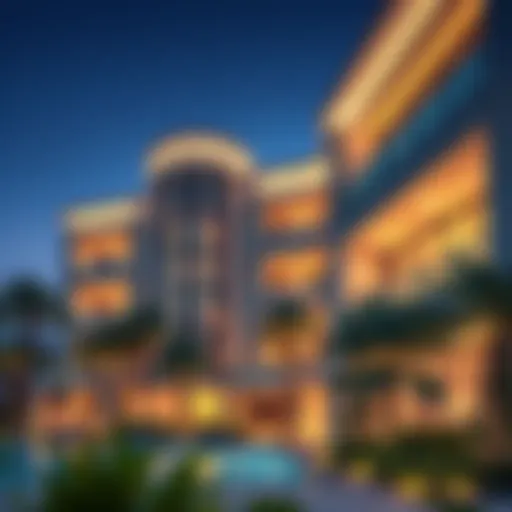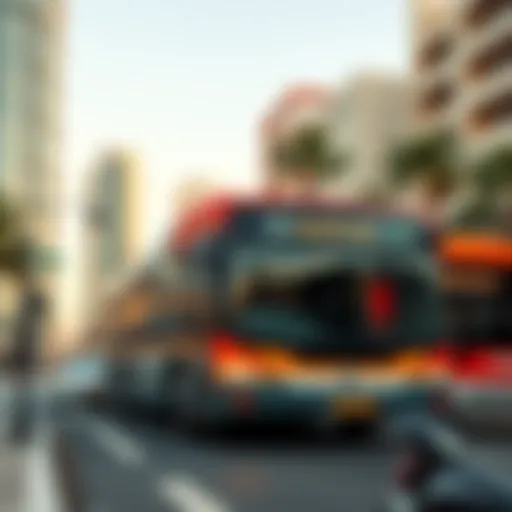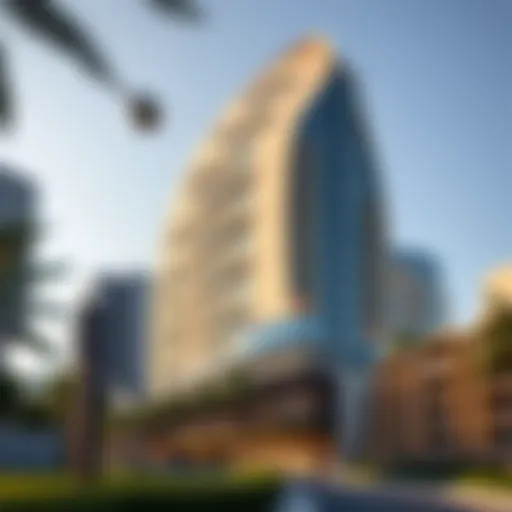UAE Ramadan 2024 Holiday: Cultural and Economic Insights
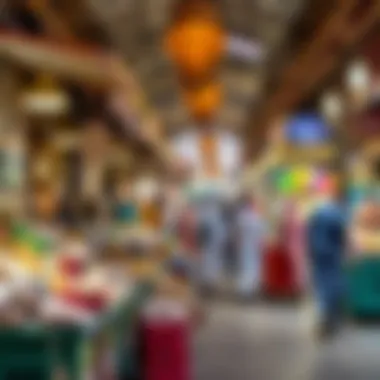

Intro
The month of Ramadan holds a profound significance in the UAE, often regarded as a time for reflection, community bonding, and cultural expression. As we approach Ramadan 2024, the holiday is expected to influence various facets of life in this vibrant nation, particularly in its bustling metropolis, Dubai. The intertwining of cultural observance with economic activities during this period creates a unique tapestry that requires careful consideration and understanding, especially for those engaged in the real estate market.
In this article, we will delve into the implications of Ramadan on diverse domains—cultural, economic, and social. This exploration aims to furnish investors, agents, and developers with critical insights that can inform their strategies and decisions as the holiday unfolds. From the anticipated dates and public sector adjustments to the nuanced effects on property values and community engagement, our analysis will provide a comprehensive view of what Ramadan 2024 entails.
This period not only signifies a time for spiritual growth but also presents a window of opportunities in the real estate sector. Stakeholders will need to navigate the changing dynamics of the market, which may include shifts in demand, rental prices, and the preferences of both locals and visitors.
With a careful examination of current trends, economic factors, and investment strategies, we'll endeavor to highlight actionable insights that can guide informed decision-making throughout this important time.
Understanding Ramadan and Its Importance
The month of Ramadan carries profound significance in the lives of Muslims around the world, particularly in the United Arab Emirates, where the holiday is interwoven with cultural and social practices. Understanding the essence of this holy month helps illuminate its multifaceted impact not only on individuals but also on local communities and economies. It’s not merely about fasting but encompasses spirituality, reflection, and community engagement.
The Concept of Ramadan
Ramadan is the ninth month of the Islamic lunar calendar, renowned for being a time of deep spiritual reflection, self-discipline, and intensive worship. Muslims who observe this month refrain from eating and drinking from dawn until dusk, which serves as a form of physical and mental purification.
This annual cycle provides an excellent opportunity to grow personally and strengthen one’s relationship with the divine. The act of fasting symbolizes empathy towards the less fortunate, instilling a sense of compassion and generosity. Some might say it’s about cleaning the slate—removing distractions to reconnect with one’s values and beliefs.
Moreover, Ramadan is marked by increased prayers, particularly the nightly Taraweeh prayers, where communities come together in mosques, reinforcing bonds and creating a supportive network. As the sun sets each day, families gather for Iftar, the meal that breaks the fast, often surrounded by loved ones—truly a heartwarming aspect of this month.
Cultural Significance in the UAE
In the UAE, Ramadan transcends mere fasting; it embodies a cultural phenomenon that brings people closer. The nation transforms itself with serene decorations and lights adorning public spaces, creating an inviting atmosphere for both residents and visitors. The excitement is palpable, with traditional Ramadan tents sprouting across the emirates, serving delicacies and hosting cultural events.
Cities like Dubai and Abu Dhabi come alive with a myriad of activities during this month. Public displays of kindness are abundant, as individuals and organizations engage in charitable initiatives. This is a time when the spirit of giving flourishes, and food donations to the less fortunate are common, fostering a sense of unity and social responsibility.
"Ramadan is not solely about refraining from food; it’s about uplifting the community spirit and nurturing relationships."
For local businesses, Ramadan can also mean an uptick in consumer engagement. Retailers often launch special promotions that resonate with the spirit of the season, while restaurants develop exclusive Iftar menus tailored to cater to the various tastes of the community. This blend of tradition and modernity illustrates how deeply rooted Ramadan is in the UAE’s cultural fabric.
Ramadan 2024: Key Dates
Understanding the timeline of Ramadan in 2024 is crucial for businesses, communities, and individuals alike in the UAE. It sets the rhythm of life and influences various sectors, including retail, hospitality, and real estate. As the holy month approaches, knowing the key dates allows stakeholders to prepare adequately for potential fluctuations in consumer behavior and investment opportunities. The excitement surrounding the beginning and the end of Ramadan offers insights into cultural practices and communal values that define this significant period.
Beginning and End of Ramadan
Ramadan is expected to commence in the evening of Sunday, March 10, 2024, depending on the moon sighting. This spiritual period lasts for 29 to 30 days, concluding with Eid al-Fitr, which is projected to start on Tuesday, April 9, 2024. These dates are not only significant on calendars; they foster a deeper understanding of the spiritual and social obligations that individuals partake in during this time.
Key Implications:
- Business Planning: Knowing these dates enables businesses to adjust their operating hours and stock levels, ensuring they meet customer demand during iftar times and the period leading up to Eid.
- Real Estate Investments: For developers and agents, it's an essential junction to gauge market movements, as residential demand may fluctuate with families gathering for prayers and Ramadan festivities.
- Community Engagement: The initiation of Ramadan invites various community activities and charitable events, influencing how residents can engage with one another and strengthen bonds.
"The alignment of spiritual reflection with community unity is what makes Ramadan a transformative month for many."
Eid al-Fitr Celebrations
Eid al-Fitr marks the conclusion of Ramadan and is celebrated with great enthusiasm. This festival brings families together, showcases cultural traditions, and reinforces community ties. It falls on the first day of Shawwal, following the last day of fasting.
During Eid al-Fitr:
- Communal Prayers: Special prayers are held at mosques and open areas, with large gatherings reflecting the sense of community.
- Feasting: A cornucopia of traditional foods is prepared, symbolizing joy and gratitude. Families often invite neighbors and friends to partake in meals, reflecting generosity.
- Gift Exchange: The tradition of giving, known as Zakat al-Fitr, often embodied in gifts or charitable donations, becomes vital in promoting social responsibility and aiding those in need.
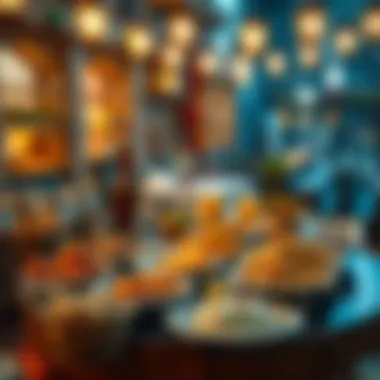

From an economic standpoint, Eid also triggers increased spending, with consumers purchasing gifts, new clothes, and food. All these factors underscore the importance of the Ramadan season in shaping the business environment in the UAE, making it a pivotal time for strategic planning and community outreach.
Public Sector Holiday Schedule
The public sector holiday schedule during Ramadan holds significant implications for both employees and the larger economic landscape in the UAE. This period not only symbolizes cultural observance but also aligns closely with business operations, influencing the productivity and economic flow in various sectors. Understanding how these holidays work is essential for anyone involved with investments, real estate, or any business operations in the UAE.
Announcement Patterns for Holidays
In recent years, the announcement of public holidays has tended to follow a standardized pattern. Typically, the UAE government releases the holiday schedule a few weeks before Ramadan begins. This timing helps organizations and employees prepare accordingly. The Ministry of Human Resources and Emiratisation generally issues a formal notification, giving people an early heads-up about their time off.
It can be quite an adjustment for businesses that may need to accommodate these changes in their operational hours. For instance, during the month of Ramadan, many firms shift their work hours significantly. Here are a few key patterns that emerge during announcements:
- Timing: Most announcements are made about two weeks before Ramadan starts, allowing employees to plan in advance.
- Variability: Dates may adjust each year depending on the lunar calendar, complicating planning for many.
- Span: Often, holidays extend beyond just the end of Ramadan to include Eid al-Fitr, which adds another layer to the scheduling considerations.
"Understanding the announcement pattern is crucial for strategic planning for any business during this season."
Expected Days Off for Employees
When it comes to days off, public sector employees typically enjoy a longer break than their private sector counterparts during Ramadan. This is partly due to the increased workload in certain sectors during the month and the importance placed on observing cultural and religious practices.
Expected days off are typically structured as follows:
- Three to five working days for Ramadan itself, depending on when it begins.
- Eid al-Fitr break, which could extend from a couple of days to a week.
Both public and private sector workers are encouraged to embrace community and family activities during this time. Here's an outline of what employees can generally expect in terms of holiday schedule:
- First Working Week of Ramadan: Adjusted timings are usually in place, with the working hours shortened to accommodate fasting.
- Mid-Ramadan Announcement: A confirmation of the exact days off for Eid al-Fitr is often communicated, providing clarity up till the holiday.
- End of Ramadan: The mood generally shifts towards celebratory, with businesses closing early to prepare for the festivities of Eid.
Being aware of these anticipated days off allows employees to plan for travel, family gatherings, or even participating in charitable activities widely associated with Ramadan. It also gives employers time to arrange staffing needs or temporary workforce solutions to ensure that business operations run smoothly during this busy period. Understanding public sector holiday schedules is not just about marking days off in a calendar; it’s about acknowledging the rhythm of life in the UAE during this significant time of the year.
For more information about official announcements, check the UAE government's official website at government.ae.
For further insights on expat work culture, visit Britannica, or navigate to community discussions on Reddit for first-hand experiences.
Impact on Local Businesses
The Ramadan season is a vital time for local businesses in the UAE, bringing about a shift in the way companies operate and engage with their customers. The holiday does not just provide an opportunity for reflection and spiritual growth; it also greatly influences the economic landscape. For stakeholders, understanding these dynamics can lead to better strategies and heightened performance during this pivotal time.
Changes in Operational Hours
During Ramadan, the operational hours for many businesses undergo significant changes. Retailers often adjust their hours to accommodate the fasting schedule. For instance, shops may remain closed during the daytime and reopen after sunset, capitalizing on the time when families gather for Iftar. It's a common practice for establishments like the Mall of the Emirates and Dubai Mall to extend their hours late into the night, offering unique promotions and special Ramadan-themed events.
Additionally, the Dubai Chamber of Commerce typically advises businesses to consider flexible working hours. This is not only to ease the fast but also to cater to increased foot traffic as people shop for Iftar and Suhoor supplies. Employers who recognize the needs of their staff during Ramadan can enhance employee satisfaction, leading to a more productive workforce. Here are some crucial points regarding operational hour changes:
- Retail shops often open after sunset, attracting evening shoppers.
- Restaurants may see increased demand for takeout and delivery options during the day.
- Family-oriented events in malls might extend operating times.
Influence on Consumer Behavior
Consumer behavior during Ramadan exhibits remarkable shifts. Fasting significantly influences purchasing patterns, which is crucial information for businesses gearing up for the holiday. During this period, many consumers prioritize buying food and beverages for breaking their fast.
Moreover, there’s a noticeable increase in the spending on gifts and festive decorations, particularly as Eid approaches. Therefore, businesses should consider:
- Offering discount packages on food items that cater to Iftar gatherings.
- Creating special shopping events to attract families who might otherwise be preoccupied with commitments during the day.
- Tailoring marketing strategies; for example, advertising deals on social media platforms to reach a wider audience during the evening hours.


Overall, observing cultural norms and rituals improves customer loyalty as consumers feel valued and understood in their traditions. In light of this, businesses must adapt their offerings to reflect the spirit of Ramadan. Ultimately, insights into consumer behavior can lead to strategic shifts in marketing approaches and product offerings, ensuring that businesses not only survive but thrive during this transformative season.
Ramadan and the Real Estate Market
The impact of Ramadan on the real estate market in the UAE is significant and multifaceted. This period is more than just a spiritual phase; it's a unique time when various factors converge, influencing both the demand and supply within the property sector. The annual observance shapes consumer behavior and investor sentiment, introducing a blend of opportunities and challenges. Understanding these dynamics is crucial for stakeholders looking to navigate the changing landscape during this festive season.
Investment Trends During Ramadan
During Ramadan, the behavior of investors and buyers can change quite noticeably. Historically, some investors may pause plans to buy or sell properties, preferring to wait until after Eid al-Fitr. However, this does not hold true for all participants in the real estate market. Several trends emerge each year that can actually open up investment opportunities.
- Increased Activity in the Residential Market: Many families prefer to move homes during Ramadan, seeking new spaces for gatherings and festivities. This includes searching for larger apartments or villas suited for family visits. Thus, properties that cater to these specific needs may see a surge in interest.
- Discounts and Promotions: Many real estate developers offer attractive deals during Ramadan as a way to boost sales. From waived fees to payment plans, Ramadan often becomes a time of notable incentives. This offers a unique opportunity for investors to secure properties at favorable terms.
- Rental Market Fluctuations: As the holy month progresses, rental demand can also spike, particularly in locations near mosques and community centers. Investors in buy-to-let properties might see increased returns if they position themselves strategically.
Thus, savvy investors who keep an eye on market developments during the Ramadan period may find themselves in a better position once the holiday concludes.
Potential Opportunities for Buyers
Buyers looking at the real estate market during Ramadan can uncover several potential advantages. With some nuanced understanding and strategic planning, they can benefit greatly from this period.
- Timing the Purchase: Ramdan might see a slowdown in the market, creating a perception of decreased competition. This can be an ideal opportunity for buyers to negotiate prices, as sellers may be more willing to make concessions.
- Engagement with Developers: Many developers ramp up their marketing efforts during this time, conducting iftar events or special open-house gatherings. Buyers can use these occasions to engage with sales representatives directly, often leading to better deals than those found during busier times.
- Understanding Community Dynamics: Ramadan is a month steeped in community spirit. Buyers could pay attention to areas that foster a sense of belonging, especially those that celebrate the festive month vibrantly. Such insights can aid in making informed decisions that resonate with long-term family and investment goals.
In summary, Ramadan serves as a backdrop for unique opportunities in the real estate market. By understanding the trends and recognizing the chances that might arise during this time, buyers and investors could very well position themselves to make advantageous moves, enriching both their financial portfolios and community experiences.
Visitor Experiences During Ramadan
Visitor experiences during Ramadan in the UAE are multifaceted and significant, providing a unique glimpse into the cultural and social fabric of this period. Understanding these experiences is crucial for stakeholders, especially those in sectors such as tourism and real estate, as it reveals how the holy month influences visitor engagement, spending habits, and overall satisfaction.
Cultural Events and Activities
During Ramadan, the UAE hosts a plethora of cultural events and activities that enrich the visitor experience. One prominent feature is the vibrant Ramadan markets. These markets pop up across cities, especially in Dubai and Abu Dhabi, offering everything from traditional handicrafts to delectable food items. Visitors can explore stalls filled with beautiful lanterns, clothing, and various local delicacies.
Live performances often take place at these markets, showcasing traditional music and dance. Such events are a perfect opportunity for tourists to witness Emirati culture first-hand beyond typical attractions.
Moreover, cultural exhibitions are organized in museums and serail houses, where visitors can engage with interactive displays and participate in workshops that promote understanding of Ramadan’s customs.
Iftars filled with local cuisine also become communal events during this month. Many hotels and restaurants offer iftar buffets that not only feature traditional dishes like harees and chebab but also cater to diverse tastes by incorporating international cuisines. This blending of flavors creates an inviting atmosphere for both tourists and residents alike.
Dining Considerations and Iftar
Dining during Ramadan poses unique considerations for visitors. One must be mindful of local customs regarding eating and drinking in public during daylight hours. The fast is broken at sunset, marked by the adhan (call to prayer), and this is when iftar gatherings become a central part of the experience.
Visitors should plan their days accordingly. Many restaurants close during the day and only begin serving food after iftar, while others may offer special menus or discounted rates to attract both locals and tourists. Reservations at popular dining venues are highly recommended, particularly for the festive iftar meals that gather families and friends.
Additionally, many organizations and communities set up open iftar gatherings in public spaces, often with free meals, encouraging a sense of community and hospitality. These events offer tourists a chance to connect with locals and other visitors in a warm, festive setting.
For those seeking a quieter meal, restaurants that cater to international cuisines often have special rooms or spaces designated for those not fasting, ensuring that everyone can enjoy meals in harmony.
"Ramadan is not only a time for fasting but also a chance to gather, celebrate, and create memories together."
Preparing for Ramadan in Dubai
As one of the most significant months in the Islamic calendar, the lead-up to Ramadan calls for careful preparation, especially in a bustling metropolis like Dubai. With an exquisite blend of tradition and modernity, understanding how to navigate this holy month is essential for both residents and visitors. The Ramadan experience in Dubai is not merely a matter of observing the fast from dawn until sunset; it involves a thorough grasp of cultural nuances and social expectations that permeate everyday life during this period.
Tips for Residents and Tourists
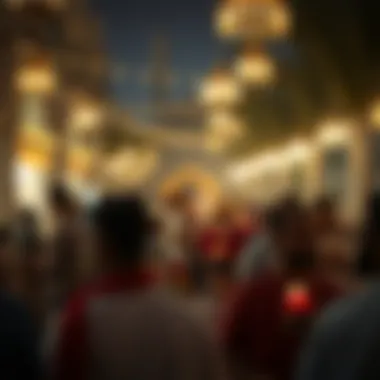

For those residing in Dubai or traveling to the UAE during Ramadan, it’s crucial to adapt to the rhythm that characterizes this month. The following tips can ease your transition and enhance your experience:
- Adjust Your Daily Schedule: Be mindful that many businesses will have altered hours. Expect reduced operations during the day, with late-night dining and shopping becoming the norm. Check timings online or through local news to stay informed.
- Respect Fasting Practices: Eating, drinking, or smoking in public during daylight hours can be frowned upon, so plan meals for after sunset. There are many Iftar (breaking the fast) options in hotels and restaurants.
- Engage with Local Culture: Make an effort to learn more about Ramadan’s significance. Attend community events or participate in charitable initiatives. This can enhance your understanding and appreciation.
- Dress Modestly: Dubai is a cosmopolitan city, but Ramadan calls for more conservative dress. This consideration is both respectful and in line with the cultural fabric of the emirate.
- Be Patient with Service Delays: The atmosphere is festive, yet slower in pace. Allow ample time for service in restaurants or shops.
These simple steps can help foster a harmonious environment during this deeply spiritual time.
Understanding Local Customs
During Ramadan, it’s vital to understand the customs that govern social interactions and community behavior in Dubai. These traditions not only reflect the historical context of the UAE but also serve as a framework for how residents observe this sacred month. Here are key customs to consider:
- Iftar Gatherings: The breaking of the fast is often a communal affair, with families and friends coming together. It’s customary for Muslims to share their meals with neighbors and the less fortunate, creating a sense of unity.
- Suhoor Practices: This pre-dawn meal can be equally social. Many choose to dine with family or friends, fostering community spirit. It's important for tourists to recognize this and possibly partake in such gatherings if invited.
- Charitable Works: Giving back is an emphasized theme during Ramadan. Residents are encouraged to contribute to charitable organizations and community efforts, highlighting the importance of compassion and generosity.
- Cultural Reflection: During this month, discussions often pivot towards spirituality and personal reflection. Engage respectfully in conversations, particularly regarding religion and cultural practices.
Understanding and respecting these customs can result in a more enriching experience for all, fostering goodwill and mutual respect. The nature of Ramadan captivates the essence of community and belonging, inviting all to participate in its spirit—whether through acts of charity or communal dining.
Social Responsibility During Ramadan
Social responsibility during Ramadan extends beyond customary practices; it embodies the spirit of community, generosity, and empathy that the holy month promotes among inhabitants in the UAE. This period presents a unique opportunity for individuals and businesses alike to reflect on their role within society, effectively contributing to a more cohesive and supportive environment. The importance of social responsibility during this time cannot be overstated, as it encourages cultural understanding and unity among diverse populations.
Charitable Initiatives and Contributions
During Ramadan, charitable initiatives gain momentum, acting as a lifeline for many vulnerable communities. Various organizations and individuals take the initiative to provide food, clothing, and financial assistance to those in need, fostering a culture of giving.
- Zakat and Sadaqah: These obligations are deeply embedded within Islamic beliefs, serving as a reminder for wealthier individuals to support those less fortunate. Many institutions facilitate the collection of Zakat, ensuring that contributions reach those who require them most.
- Food Drives: Local mosques, nonprofit organizations, and community groups often band together to host food drives that distribute necessities to families facing financial difficulties. This not only assists them during the holy month but also reinforces communal bonds.
- Healthcare Initiatives: Some charitable organizations focus on providing free medical check-ups and health services to low-income individuals, ensuring that health does not take a back seat during Ramadan.
The act of giving during Ramadan reflects one's commitment to social responsibility, inspiring other communities and individuals to follow suit.
Community Engagement Activities
Community engagement flourishes during Ramadan, as various organizations and local authorities host events aimed at bringing people together. These activities strengthen ties between residents and promote cultural exchange.
- Iftar Gatherings: Many communities organize Iftar events to break the fast together, inviting diverse individuals regardless of their background. This social gathering not only fosters inclusion but also promotes dialogue and understanding among different cultures.
- Volunteer Opportunities: Ramadan opens the door to volunteerism, with many individuals seeking to contribute their time and skills to various causes. Whether it’s serving meals at community centers or assisting with event planning, volunteering allows individuals to make a tangible impact.
- Cultural Programs: Various cultural programs showcase traditional practices and educate attendees about Ramadan’s significance, further nurturing appreciation and respect for different cultures.
Engaging in community activities illustrates an individual's commitment to social responsibility during Ramadan. Moreover, these initiatives lay the groundwork for longer-lasting relationships, ultimately promoting harmony in an ever-evolving multicultural society.
"The essence of Ramadan lies not only in fasting but in expanding our generosity and kindness, impacting positively the lives around us."
Collectively, charitable initiatives and engagement activities serve as pillars of social responsibility during Ramadan, encouraging a spirit of unity and empathy within the UAE. As the holy month approaches, stakeholders in the real estate sector, along with others, should recognize the potential to strengthen their community ties while supporting meaningful causes.
The End: The Essence of Ramadan in the UAE
Ramadan embodies a multifaceted significance in the UAE, weaving together cultural, economic, and social threads that define the nation’s identity. As the sun sets and the fast is broken, not just families but entire communities come together, symbolizing unity and mutual respect. The atmosphere buzzes with a spirit that transcends mere observance; it carves out a collective consciousness that fosters generosity, gratitude, and reflection. This article encapsulates these intricate dynamics, providing insights into the broader implications of Ramadan 2024 in the United Arab Emirates.
Reflecting on the Experience
Every Ramadan is distinct. In 2024, as Sheikh Zayed Road lights up with vibrant decorations and mosques resonate with the sounds of prayer, the experience shifts slightly, aligning with current global realities. Expanding from merely fasting, it invites participants to engage in charitable acts, often ensuring no one goes hungry. Observers from overseas partake in these cultural exchanges, adding layers to the local experience.
Understanding the essence of Ramadan includes recognizing these communal efforts. Businesses adapt their approaches, perhaps offering special deals to encourage mindfulness and community spirit. Local charities ramp up their initiatives, providing meals and support to those in need. It's a significant time to reflect on both personal growth and social responsibilities.
“Ramadan ignites a spark of empathy, encouraging a culture of giving and support that lasts well beyond the month, shaping the societal fabric of the UAE.” Here's where the beauty lies: beneath the surface of daily routines, people's actions align with a larger purpose. The call during this month not only emphasizes spirituality but also beckons for community-building, creating networks rich in support and positivity.
Looking to the Future
The implications of Ramadan stretch far and wide into the future. For investors and developers, the period holds promise, as businesses tend to adapt their model to cater to the changing consumer needs. The astute observer recognizes that understanding these shifts is key to harnessing the potential of the fasting month.
With the increased focus on sustainability and social responsibility, the next few Ramadans may very well be catalysts for fueling meaningful investments in community-centric developments. Initiatives promoting eco-friendly practices during iftar gatherings or dedicating spaces for community interactions can reshape the landscape of business in the UAE. In essence, this month doesn’t just tick a box; it sets the stage for sustainable evolution in both society and market.
It’s essential to keep a watchful eye on how the overarching themes that arise during Ramadan will influence the broader economic landscape in the region. Aligning one's strategic objectives with the core values of compassion, inclusivity, and community can create unique opportunities for success. Investors and stakeholders, who adapt in accordance with the cultural pulse of the UAE, are likely to navigate the complexities of the market more successfully.
Understanding the essence of Ramadan isn’t just about acknowledging a tradition; it’s about embracing the lessons of resilience and unity that echo through the fabric of UAE society. This insight lays the groundwork for informed decisions in the sectors that flourish during this sacred time.

